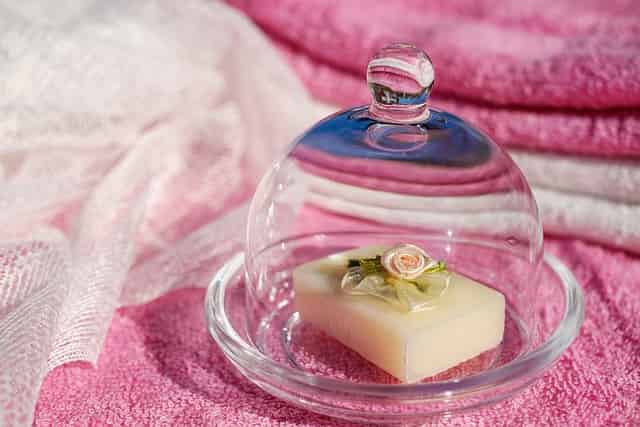Hey there! This post may contain affiliate links, meaning we get a small commission if you make a purchase through our links at no cost to you. I greatly appreciate your support! For more information please check our Disclosure Page.
If you’ve got sensitive skin, you know the struggle is real. Finding a product that doesn’t irritate or dry out your skin can feel like a never-ending quest. That’s where goat milk soap steps in. Known for its gentle yet effective cleansing properties, goat milk soap is a natural remedy for those with sensitive skin. Packed with vitamins, minerals, and moisturizing fats, it’s no wonder people have been turning to goat milk soap for centuries.
In this article, we’re diving into everything you need to know about goat milk soap, from how it’s made to the best options available on the market. So, if you’re ready to give your skin the tender loving care it deserves, keep reading!
What is Goat Milk Soap?
Goat milk soap is exactly what it sounds like – soap made from the milk of goats. However, it’s more than just a soap bar with a quirky ingredient. Goat milk has a unique composition that makes it incredibly nourishing for the skin.
Besides, it contains high levels of vitamins like A and E, as well as fatty acids that help keep the skin moisturized.
History and Origins of Goat Milk Soap
The use of goat milk in skincare can be traced back to ancient Egypt, where Cleopatra was rumored to bathe in goat milk to maintain her famously smooth and radiant skin.
Fast forward to today, and goat milk soap has become a popular choice for those seeking natural, gentle skincare solutions.
Benefits of goat milk soap
1. Rich in minerals and vitamins
One of the main benefits of goat milk soap is that it is rich in vitamins and minerals essential for skin health. It is particularly high in:
- Vitamin A: This is essential for skin repair and can help in treating acne, reducing wrinkles, and promoting smoother skin.
- Vitamin C: Known for its brightening effects, goat milk also helps in collagen production, which keeps the skin youthful and elastic.
- Vitamin D: Helps in repairing damaged skin cells as well as improving the overall skin tone.
- Calcium: Promotes skin regeneration and repairs the skin barrier.
2. Gentle Exfoliation
Goat milk’s lactic acid acts as a natural exfoliator. This alpha-hydroxy acid aids in the removal of dead skin cells, promoting the growth of new, healthy skin.
In contrast to certain harsh or irritating chemical exfoliants, the lactic acid in goat milk soap gently exfoliates the skin, leaving it smooth without stripping it of natural oils.
3. Hydrates and moisturizes
The potent hydration that goat milk soap offers is among its most well-known advantages. The fats and oils found in goat milk form a natural lipid barrier on your skin, locking in moisture.
This is particularly vital for those who require more than surface-level hydration due to dry or flaky skin.
Additionally, goat milk soap contains fatty acids like caprylic acid, which aid in the absorption of moisture and keep your skin hydrated and supple for extended periods of time.
4. Perfect for individuals with sensitive skin
Nowadays, a lot of soaps on the market contain chemicals, synthetic compounds, as well as artificial smells that can aggravate sensitive skin.
However, goat milk soap is a much kinder alternative because it is created entirely of organic components.
The soap helps preserve the skin’s natural barrier and avoid irritation because its pH is remarkably near to that of human skin.
This makes the soap a popular alternative for individuals with eczema, psoriasis, or rosacea, who usually struggle to find products that do not cause flare-ups or additional dryness.
5. Supports acne-prone skin
If you have acne, it can be difficult to find a soap that doesn’t aggravate your skin. Goat milk soap contains lactic acid, which gently exfoliates the skin by removing dead skin cells that can block pores and cause outbreaks.
Again, the soap also has antibacterial qualities that help combat acne-causing germs without making you feel dry.
Many acne treatments cause the skin to become dry and irritated by removing its natural oils.
With its ability to cleanse the skin without compromising its natural moisture barrier, goat milk soap provides a more balanced treatment.
6. Fights inflammation
The fat molecules in goat milk soap are what give it its anti-inflammatory qualities.
The soap is perfect for those who suffer from inflammatory skin conditions like psoriasis, eczema, or rosacea because these molecules aid to lessen skin inflammation and redness.
Using goat milk soap on a regular basis may help soothe and calm the skin, lowering inflammation and restoring equilibrium.
Why Goat Milk Soap is Ideal for Sensitive Skin
If you are struggling with sensitive skin, you’ve likely tried countless products promising relief. Enter goat milk soap – a natural solution that is gaining popularity for its gentle yet effective properties. Let’s explore why this modest soap might be the answer you’ve been searching for.
Gentle Cleansing Properties
Goat milk soap is less likely to strip the skin of its natural oils compared to commercial soaps. This is vital for sensitive skin, which can be easily irritated by harsh cleansers.
Moisturizing Effects
Goat milk is naturally high in fatty acids and triglycerides, which help lock in moisture and keep the skin hydrated. This makes goat milk soap particularly beneficial for dry and sensitive skin types that need extra hydration.
Rich in Minerals and Vitamins
The minerals and vitamins found in goat milk, especially vitamin A, play an important role in maintaining healthy skin. Vitamin A helps repair damaged skin tissue, reduce fine lines, and promote cell turnover, making goat milk soap a great choice for maintaining youthful and radiant skin.
Anti-inflammatory Effects
If you are prone to redness, irritation, or skin conditions like eczema, goat milk soap can provide relief. It has lactic acid which helps in soothing redness and inflammation. Again, it contains selenium, an antioxidant that can reduce skin inflammation. Probiotics which are naturally present in goat milk also support skin health.
pH-balanced for Skin Health
Your skin’s natural pH is slightly acidic, around 5.5. Several commercial soaps are alkaline, which can disrupt this balance. Goat milk soap, however: has a pH close to that of human skin; helps maintain your skin’s acid mantle; and lowers the risk of bacterial growth and infections.
Gentle Exfoliation
Exfoliation is important for healthy skin, but harsh scrubs can irritate sensitive skin. Goat milk soap provides a gentler alternative: it contains alpha-hydroxy acids (AHAs) – naturally exfoliate dead skin cells. Again, it is non-abrasive: unlike physical exfoliants that can cause micro-tears.
To better comprehend how goat milk soap compares to other common soaps, consider this comparison:
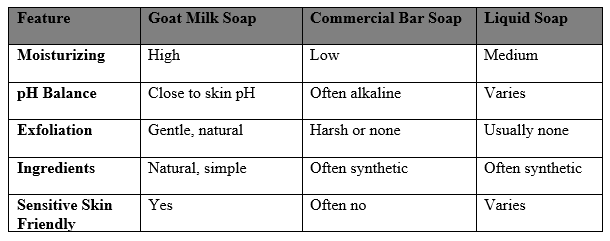
Table 1: Comparison of Goat milk soap with other soaps.
How Goat Milk Soap is Made
The process of making goat milk soap can vary, but most soaps are made using one of two methods: the cold-process method or the hot-process method.
Key Ingredients in Goat Milk Soap
Quality goat milk soaps combine a number of natural components to create a nourishing and gentle cleansing experience. Some of the essential components you’ll find in the best goat milk soaps include:
- Nourishing Botanicals: Botanicals play a crucial role in enhancing the skin-loving properties of goat milk soaps. These plant-based ingredients offer various benefits. For instance, calendula – soothes inflammation and promotes healing. Oatmeal – exfoliates gently and relieves itching. Chamomile – calms irritated skin and reduces redness. Aloe vera – cools and hydrates the skin.
- Natural Colorants: While not essential for the soap’s effectiveness, natural colorants add visual appeal and can offer additional skin benefits. Some common natural colorants in goat milk soaps include: turmeric – yellow; spirulina – green; rose clay – pink; activated charcoal – black.
- Essential Oils: Essential oils in goat milk soaps serve dual purposes: they offer a natural fragrance and provide aromatherapy benefits. Some popular essential oils you’ll find in quality goat milk soaps are lavender, peppermint, tea tree, and eucalyptus.
- Raw Goat Milk: The main ingredient in these soaps is, of course, raw goat milk. It’s important to look for soaps that use fresh, raw goat milk instead of powdered versions. Raw goat milk contains lactic acid; fatty acids; and Vitamins A, B1, B6, B12, and E.
Cold-Process Method vs. Hot-Process Method
- Cold-Process Method: This traditional method involves mixing oils and lye with goat milk at room temperature, and then allowing the soap to cure over several weeks. The result is a smooth, long-lasting bar of soap with a creamy texture.
- Hot-Process Method: In this method, the soap mixture is heated to speed up the saponification process. The soap is ready to use more quickly, but it may have a rougher texture compared to cold-process soap.
DIY Goat Milk Soap – Easy & Natural
Top 15 Best Goat Milk Soaps
1. Beekman 1802
Beekman 1802 has gained popularity for its luxurious goat milk skincare products, including their high-quality soaps. Founded by two city dwellers turned farmers, this brand focuses on clean beauty and farm-to-skin philosophy.
Key features
- Known for its luxurious lather, this soap is enriched with goat milk, shea butter, and essential oils. It’s a great choice for moisturizing and soothing irritated skin.
Skin types: Dry, Sensitive, Combination
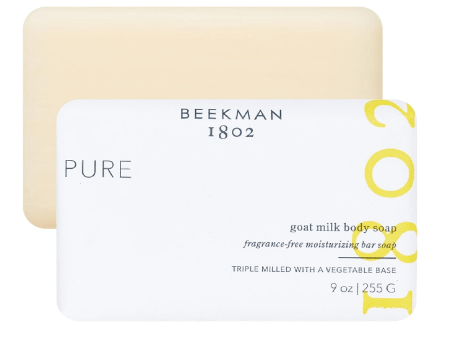
Fig. 1: Beekman 1802 (Amazon)
2. Southern Natural
Southern Natural is a family-owned business that takes pride in creating handcrafted goat milk soaps using milk from their own goat herd. Their commitment to quality and natural ingredients makes them a standout choice for those seeking gentle, nourishing skincare.
Key features
- Made with fresh, raw goat milk
- All-natural ingredients
- Variety of scents and formulations
- Suitable for all skin types, especially sensitive skin
Skin Types: Dry, Sensitive
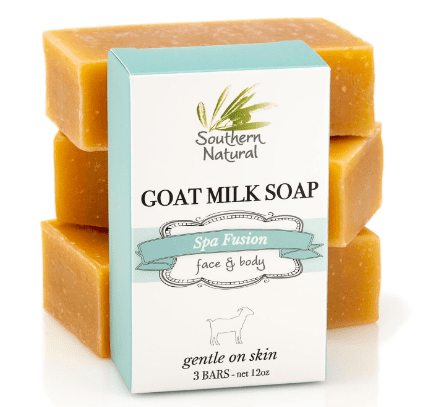
Fig. 2: Southern Natural (Amazon)
3. Legend’s Creek Farm
Legend’s Creek Farm is known for its artisanal approach to goat milk soap making. They combine traditional methods with modern skincare science to create luxurious soaps that cater to various skin concerns.
Key Features
- This soap is made with a high concentration of fresh goat milk, shea butter, and honey. It’s known for its rich, creamy lather and soothing properties.
Skin Types: Dry, Sensitive, Normal
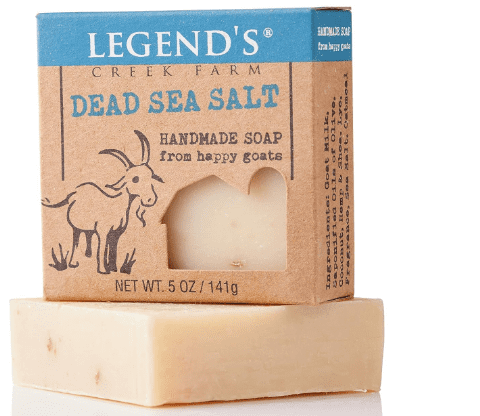
Fig. 3: Legend’s Creek Farm (Amazon)
4. Zum Bar
Zum Bar, a product line from Indigo Wild, offers a unique twist on traditional goat milk soaps. Their colorful, aromatic bars are perfect for those who want to add a bit of fun to their skincare routine without compromising on quality.
Key Features
- Wide range of natural scents and essential oil blends
- Handmade in small batches
- Uses food-grade oils for added skin benefits
- Offers multi-bar packs for variety
Skin Types: All Skin Types
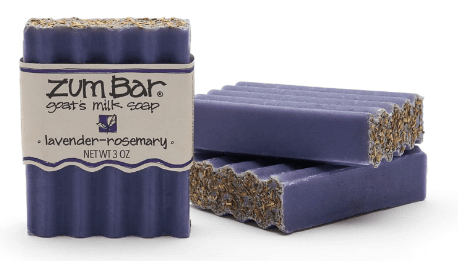
Fig. 4: Zum Bar (Amazon)
5. Canus
Canus is a well-established brand that has been producing goat milk skincare products for over two decades. Their soaps are widely available and offer a balance of quality and affordability.
Key Features
This soap combines goat milk with plant-based ingredients to create a creamy, nourishing bar that’s perfect for sensitive skin. It’s also enriched with glycerin to help lock in moisture.
Skin Types: Sensitive, Normal, Dry
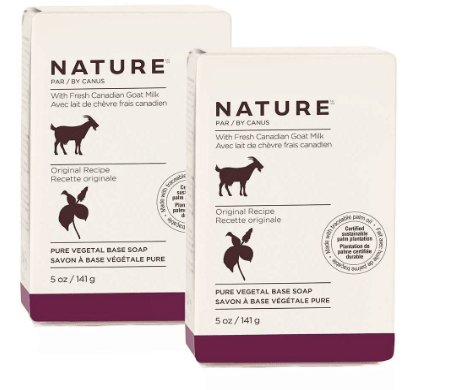
Fig. 5: Canus (Amazon)
6. Dr. Squatch Goat Milk Soap
Dr. Squatch’s goat’s milk soap is a favorite among men for its rugged scent and effective cleansing properties. It combines goat milk with shea butter and coconut oil to provide a deep clean without drying out the skin.
Key Features
- Popular for its masculine scents, Dr. Squatch’s goat milk soap is handcrafted and made with natural ingredients. It offers deep cleansing without drying out the skin.
Skin Types: Normal, Oily, Combination
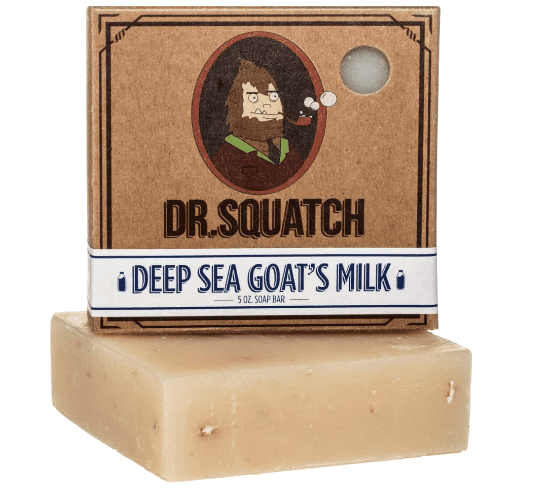
Fig. 6: Dr. Squatch Goat Milk Soap (Amazon)
7. Indigo Wild Zum Bar
Indigo Wild’s Zum Bar goat’s milk soap is a crowd favorite for its delightful scents and skin-loving ingredients. The soap is infused with essential oils and natural colorants, making it a treat for both the skin and the senses.
Key Features
Known for its funky packaging and unique scents, Indigo Wild’s Zum Bar uses goat milk to moisturize while leaving your skin feeling clean and refreshed.
Skin Types: All Skin Types
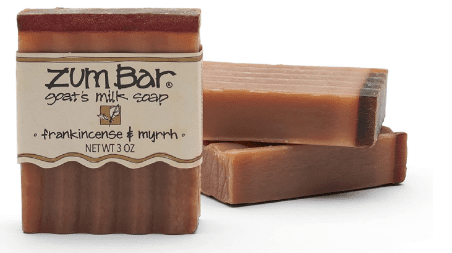
Fig. 7: Indigo Wild Zum Bar (Amazon)
8. Bend Soap Company
For those with extra-sensitive skin or allergies, Bend Soap Company’s unscented goat milk soap is a top pick. This soap is made with simple, all-natural ingredients and is free from fragrances, making it ideal for those who prefer a minimalist approach to skincare.
Key Features
Handmade with fresh goat milk, coconut oil, and olive oil, this soap is ideal for those with sensitive skin. It’s free of synthetic fragrances and dyes, making it perfect for anyone looking for pure and natural soap.
Skin Types: Sensitive, Dry, Normal
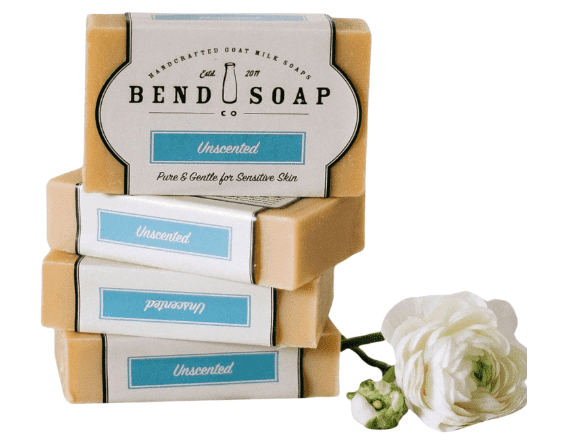
Fig. 8: Bend Soap Company (Amazon)
9. Caprina Fresh Goat’s Milk Soap
Caprina by Canus offers a fresh goat’s milk soap that is both affordable and effective. This soap lathers well and leaves the skin feeling smooth and refreshed, making it a great everyday option.
Key Features
A popular choice for everyday use, Caprina’s soap is gentle on the skin and offers a fresh, clean scent. It’s enriched with fresh goat’s milk and is free of parabens and phosphates.
Skin Types: Normal, Sensitive
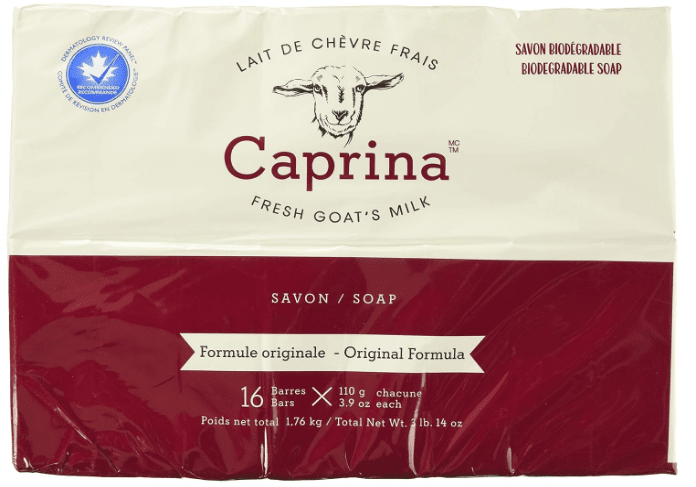
Fig. 9: Caprina Fresh Goat’s Milk Soap (Amazon)
10. Dionis Goat Milk Soap
Dionis Goat Milk Soap is a luxurious, moisturizing soap that stands out for its blend of nourishing ingredients. Known for its creamy lather, this soap combines the benefits of goat milk with soothing elements like aloe vera and chamomile, creating a gentle cleansing experience for all skin types, especially sensitive and dry skin.
Key Features
This soap blends goat milk with aloe vera and chamomile, creating a calming and hydrating experience. It’s perfect for daily use and helps in maintaining the skin’s natural pH balance.
Skin Types: Sensitive, Normal, Dry
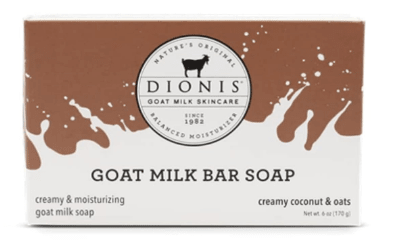
Fig. 10: Dionis Goat Milk Soap (Amazon)
11. Horse ‘O Peace Ranch Goat Milk Soap
Horse ‘O Peace Ranch Goat Milk Soap is a handcrafted, all-natural soap that prioritizes skin health and purity. Made with raw goat milk straight from the ranch, this soap is carefully designed to provide deep nourishment and gentle cleansing, making it an excellent choice for those with sensitive or problematic skin.
Key Features
Fresh, raw goat milk is the foundation of this soap, bringing a wealth of skin-loving nutrients such as vitamins A, B6, B12, and E. Its natural lactic acid helps gently exfoliate dead skin cells, leaving the skin smooth and radiant.
Again, it is completely free of synthetic chemicals, preservatives, and artificial fragrances, making it a safe and gentle option for even the most sensitive skin.
Skin Types: All Skin Types, Sensitive
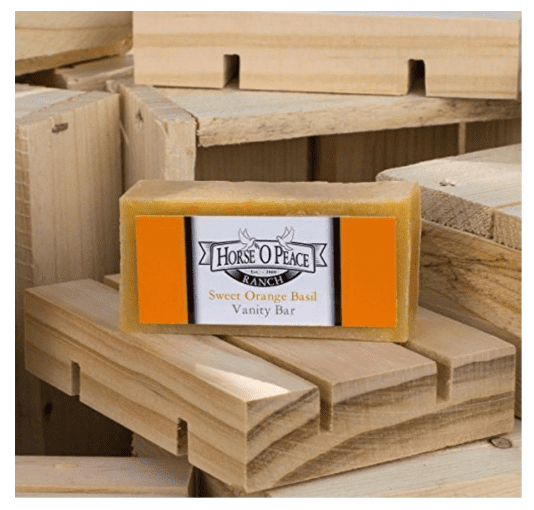
Fig. 11: Horse ‘O Peace Ranch Goat Milk Soap (Amazon)
12. Sunaroma Goat Milk Soap
Sunaroma Goat Milk Soap is a premium, nourishing soap that brings together the benefits of goat milk with enriching oils for a hydrating and soothing cleanse. Crafted with skin-loving ingredients, this soap is designed to provide gentle care for all skin types while promoting healthier, more radiant skin.
Key Features
Infused with coconut oil and olive oil, Sunaroma’s goat milk soap is designed to hydrate and repair damaged skin. It’s cruelty-free and made with sustainable ingredients.
Skin Types: All Skin Types
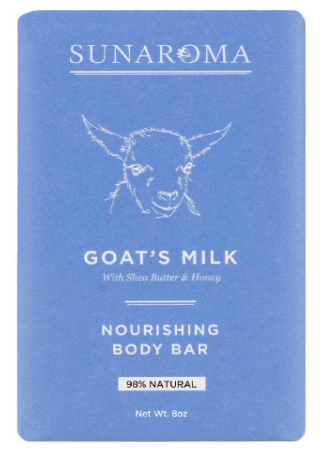
Fig. 12: Sunaroma Goat Milk Soap (Amazon)
13. Goat Milk Stuff Bar Soap
Goat Milk Stuff’s purity soap is a simple, unscented soap made with fresh goat milk and a blend of nourishing oils. It’s designed for people with sensitive skin and those who prefer an unscented option.
Key Features
This family-owned brand uses goat milk from their own farm to create nourishing soaps that are free from harmful chemicals. It’s ideal for those with eczema or extremely dry skin.
Skin Types: Eczema-Prone, Dry, Sensitive
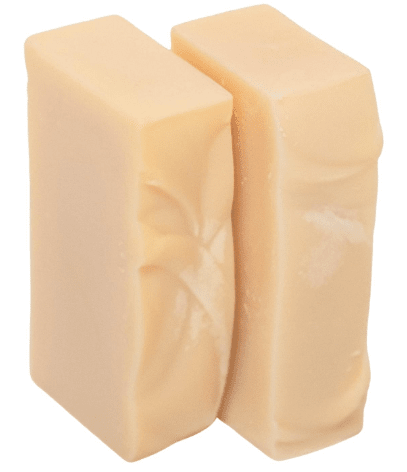
Fig. 13: Goat Milk Stuff Bar Soap (Amazon)
14. Nubian Heritage Goat’s Milk & Chai Soap
Nubian Heritage Goat’s Milk & Chai Soap is a luxurious, exotically scented soap that combines the moisturizing benefits of goat milk with the rich, aromatic spices of chai and the soothing properties of rose extracts. This soap offers a unique skincare experience that is both nourishing and indulgent, making it a standout choice for anyone looking to elevate their daily routine.
Key Features
This exotic soap blends goat milk with chai and rose extracts for a luxurious skincare experience. It’s ideal for those looking for both hydration and a subtle fragrance.
Skin Types: Dry, Normal, Sensitive
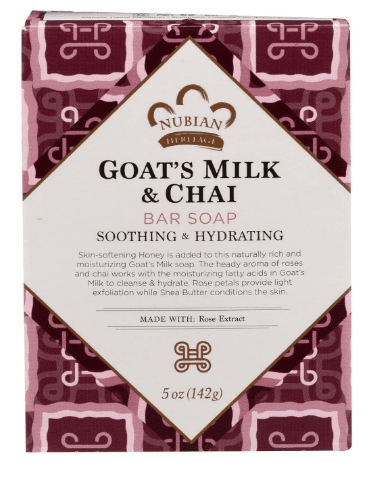
Fig. 14: Nubian Heritage Goat’s Milk & Chai Soap (Amazon)
15. L’Occitane Goat Milk Soap
L’Occitane Goat Milk Soap is a luxurious, gentle bar soap that combines the nourishing benefits of goat milk with other high-quality natural ingredients to provide a rich, moisturizing cleanse.
Designed to pamper the skin, this soap offers a soothing experience for daily use, leaving your skin feeling soft, smooth, and refreshed.
Key Features
- Known for their commitment to high-quality, natural ingredients, L’Occitane ensures that their goat milk soap upholds their brand’s reputation for luxurious and effective skincare products.
- L’Occitane Goat Milk Soap features a delicate, pleasant scent that enhances the overall bathing experience, providing a touch of elegance and relaxation.
Skin Types: Dry, Normal, Sensitive
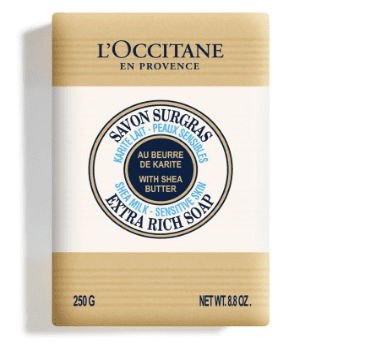
Fig. 15: L’Occitane Goat Milk Soap (Amazon)
Factors to Consider When Choosing Goat Milk Soap
Now that you know which goat milk soap brands are the best, it’s time to learn about the important things to look for when choosing the right soap for your skin type. You will be in a better position to make an informed choice that meets your unique requirements and preferences if you keep these factors in mind.
Skin type compatibility
When choosing a goat milk soap, it’s crucial to consider your skin type. While goat milk soaps are generally suitable for sensitive skin, different formulations can cater to various skin concerns:
- Dry skin: Look for soaps with additional moisturizing ingredients like shea butter or coconut oil.
- Oily skin: Opt for soaps with clay or activated charcoal to help absorb excess oil
- Combination skin: Choose a balanced formula that doesn’t over-dry or over-moisturize
Packaging and sustainability
As a conscious consumer, you should also consider the packaging and sustainability aspects of the goat milk soap you choose:
- Eco-friendly packaging: Look for soaps that use minimal, recyclable, or biodegradable packaging.
- Refill options: Some brands offer refill programs to reduce waste.
- Sustainably sourced ingredients: Check if the brand uses ethically sourced goat milk and other natural ingredients
Fragrance preferences
Your personal scent preferences play a great role in choosing the right goat milk soap:
- Unscented: If you have extremely sensitive skin or prefer to avoid fragrances altogether, opt for unscented varieties.
- Natural fragrances: Look for soaps scented with essential oils rather than synthetic fragrances.
- Seasonal scents: Some brands offer seasonal variations, allowing you to switch up your soap fragrance throughout the year.
Additional ingredients
While goat milk is the star ingredient, other components can enhance the soap’s benefits:
- Essential oils: These can provide aromatherapy benefits and natural fragrance.
- Herbs and botanicals: Ingredients like lavender, chamomile, or rosemary can offer additional skin-soothing properties.
- Exfoliants: Some soaps may include gentle exfoliants like oatmeal or poppy seeds for added skin-smoothing effects.
How to Use Goat Milk Soap Effectively
Proper Application Techniques
To get the most out of your goat milk soap and ensure it’s gentle on your sensitive skin, follow these application techniques:
- Wet your skin with lukewarm water
- Lather the soap in your hands or on a washcloth
- Gently massage the lather onto your skin in circular motions
- Rinse thoroughly with lukewarm water
- Pat your skin dry with a soft towel
For facial use, be extra gentle and avoid the delicate eye area. You may want to use a separate, smaller piece of soap specifically for your face to prevent cross-contamination.
Remember, goat milk soap is naturally moisturizing, so you might find that you need less additional moisturizer after use. Nevertheless, if your skin feels tight or dry, don’t hesitate to apply a light, natural moisturizer after patting your skin dry.
Frequency of Use
You might wonder how often you should use goat milk soap on your sensitive skin. Here’s a general guideline:
- For face: Once or twice daily
- For body: Daily or every other day
- For hands: As needed throughout the day
Remember, everyone’s skin is different. You may need to adjust the frequency based on your skin’s reaction and needs.
Storage Tips
Proper storage of your goat milk soap is crucial to maintain its quality and extend its lifespan. Here are some essential tips:
- Keep your soap dry between uses
- Use a well-draining soap dish
- Store in a cool, dry place away from direct sunlight
- Avoid leaving soap in the shower or bathtub
By following these storage tips, usage guidelines, and application techniques, you’ll be able to harness the full potential of your goat milk soap for your sensitive skin.
Comparing Goat Milk Soap to Other Natural Soaps
Goat Milk Soap vs. Shea Butter Soap
Shea butter soap is known for its moisturizing properties, but how does it stack up against goat milk soap?
- Moisturizing ability: Both are excellent moisturizers, but goat milk soap has a slight edge due to its natural fat content.
- pH level: Goat milk soap has a pH closer to human skin, making it less likely to cause irritation.
- Nutrient content: Goat milk soap is rich in vitamins and minerals that nourish the skin.
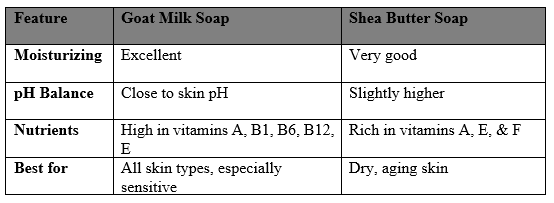
Table 2: Comparison of Goat milk soap and Shea butter soap.
Goat Milk Soap vs. Olive Oil Soap
Olive oil soap, also known as Castile soap, is another popular natural option. Here is how it compares to goat milk soap:
- Cleansing power: Goat milk soap offers a creamier lather and more effective cleansing.
- Skin nourishment: While olive oil soap is moisturizing, goat milk soap provides additional nutrients.
- Sensitivity: Both are gentle, but goat milk soap is usually better tolerated by those with extremely sensitive skin.
Goat Milk Soap vs. Cow Milk Soap
You might wonder about the difference between goat milk and cow milk soaps. Here are the key differences:
- Fat content: Goat milk has a higher fat content, making its soap more moisturizing.
- Allergen potential: Goat milk is less likely to trigger allergies compared to cow milk.
- Nutrient profile: Both are nutrient-rich, but goat milk contains more vitamin A and certain minerals.
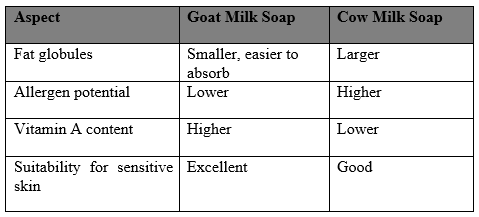
Table 3: Comparison of Goat milk soap and cow milk soap.
While all these natural soaps have their advantages, goat milk soap usually emerges as the superior choice for sensitive skin because of its unique combination of moisturizing properties, skin-friendly pH, and rich nutrient profile.
Its gentle yet effective cleansing action, coupled with its nourishing qualities, makes it an excellent option for those seeking a natural solution for their skincare needs.
DIY Goat Milk Soap Making
Creating your own goat milk soap allows you to customize the ingredients and scents to suit your preferences.
Safety Precautions
Before you start your soap-making journey, it’s important to prioritize safety. Working with lye, a key ingredient in soap-making, requires careful handling. Below are some essential safety measures you should follow:
- Wear protective gear: Always use safety goggles, gloves, and long-sleeved clothing to protect your skin and eyes.
- Work in a well-ventilated area: Ensure proper air circulation to avoid inhaling fumes.
- Keep vinegar nearby: In case of lye spills, neutralize with vinegar before cleaning up.
- Use dedicated equipment: Have separate tools for soap-making to avoid contamination.
Customization Options
One of the joys of making your own goat milk soap is the ability to customize it to your liking. Below are some ways you can personalize your soap:
- Essential oils: Add your favorite scents for aromatherapy benefits.
- Exfoliants: Incorporate natural ingredients like oatmeal or coffee grounds for gentle exfoliation.
- Colors: Use natural colorants like clays or plant-based powders to create visually appealing soaps.
- Shapes and molds: Experiment with different soap molds to create unique shapes and designs.

Table 4: Customization options
Basic Recipe
Here is a basic goat milk soap recipe to get you started:
Ingredients:
- Fresh goat milk (or frozen for better handling)
- Distilled water
- Lye (sodium hydroxide)
- Olive oil
- Coconut oil
- Palm oil (or shea butter for a palm-free option)
- Essential oil of choice (lavender, peppermint, or tea tree work well)
- Dried herbs, honey, oats, or activated charcoal for added benefits
Instructions:
- Slowly add lye to the frozen goat milk, stirring until dissolved. Let cool to 100°F.
- Melt and combine oils, allowing them to cool to 100°F.
- Slowly pour the lye mixture into the oils, stirring constantly.
- Blend with a stick blender until the mixture reaches a “trace” (pudding-like consistency).
- Add any desired essential oils or additives.
- Pour the mixture into molds and allow it to set for 24-48 hours.
- Remove from molds and cure for 4-6 weeks before use.
Note, soap-making is both an art and a science. As you gain experience, you will be able to experiment with various oils, additives, and techniques to create your perfect goat milk soap.
With practice, you will soon be crafting luxurious, custom-made soaps that rival those available in stores.
You can Get Your Soap-Making Supplies Here:
Ingredients
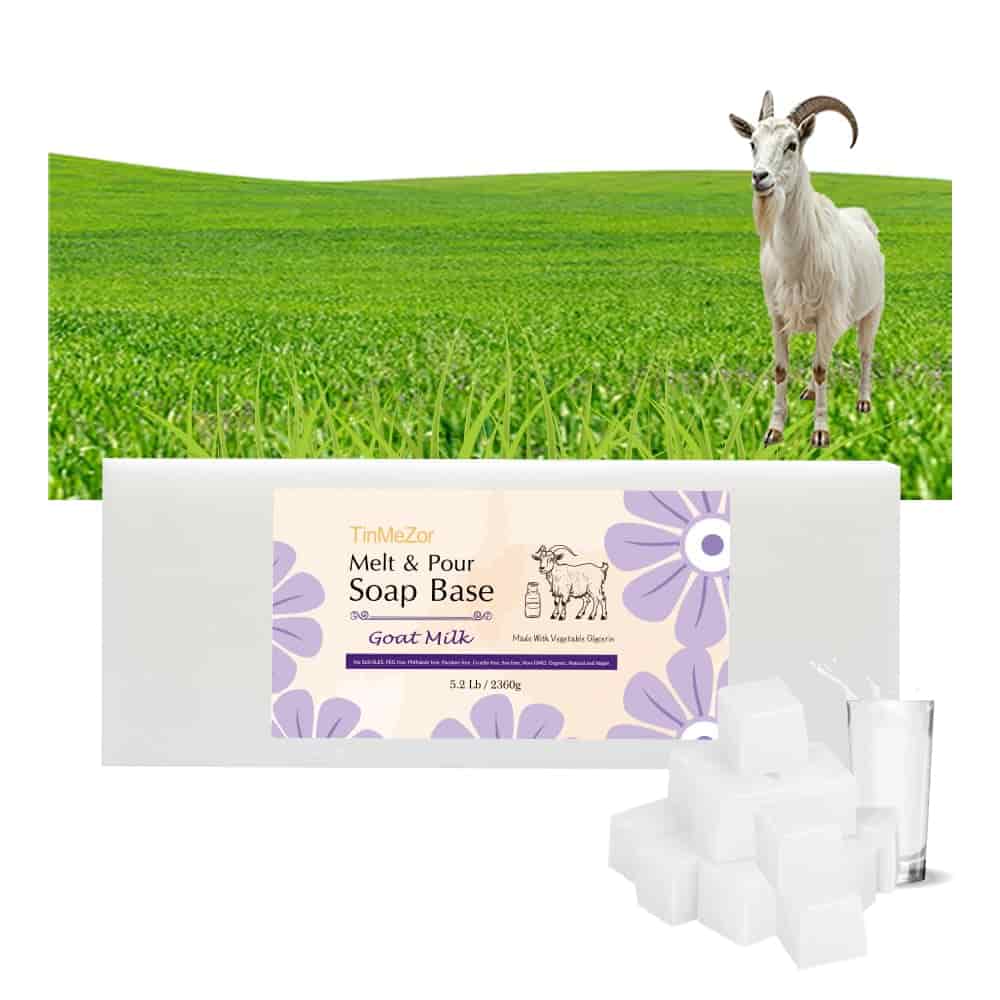
Frozen goat milk soap
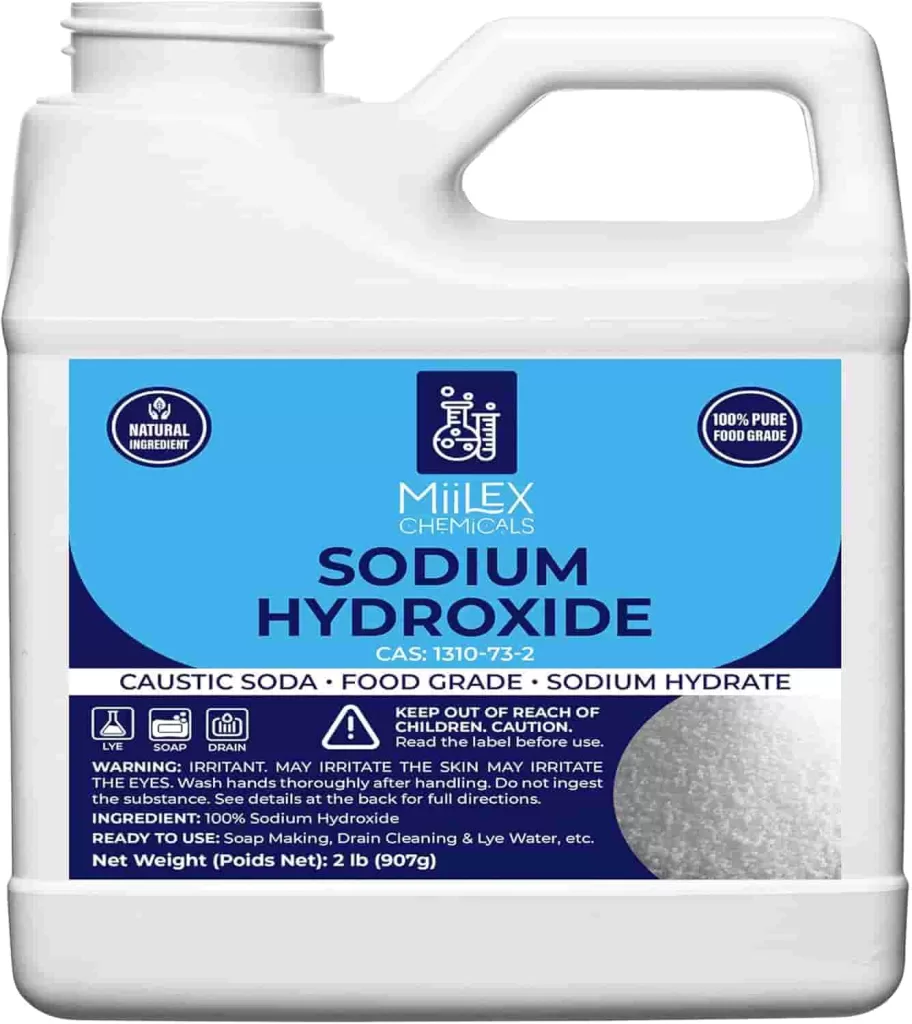
Lye (sodium hydroxide)
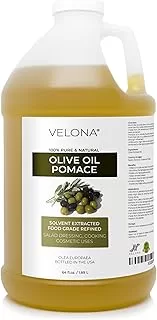
Olive oil
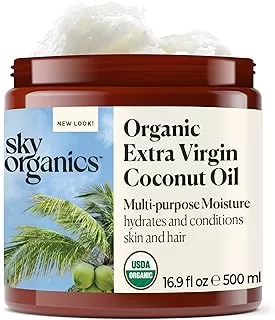
Coconut oil
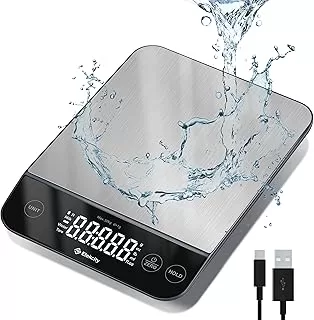
Digital Scale

Immersion blender
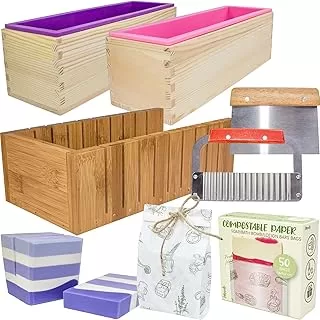
Soap making kit & wooden cutter

Infrared Thermometer
Conclusion
Goat milk soap provides a natural, gentle solution for those with sensitive skin. With its rich content of vitamins, minerals, and moisturizing fats, it helps soothe, hydrate, and protect the skin.
Whether you’re dealing with dryness, irritation, or simply want a more natural skincare routine, goat milk soap is a fantastic choice. The top 15 options listed in this article offer a variety of choices to suit your specific needs, so go ahead and give them a try!
FAQs
1. What are the benefits of goat milk soap for acne-prone skin?
Goat milk soap contains lactic acid, which gently exfoliates the skin, helping to unclog pores and reduce acne breakouts. Its anti-inflammatory properties also help soothe irritated skin.
2. Can goat milk soap be used for babies and children?
Yes, goat milk soap is gentle enough for babies and children, especially if you choose an unscented version with minimal ingredients.
3. How long does a bar of goat milk soap typically last?
A bar of goat milk soap can last anywhere from 4 to 6 weeks, depending on how often it is used and how it is stored. Keeping it dry between uses will help extend its lifespan.
4. Is goat milk soap safe for people with eczema?
Yes, many people with eczema find relief with goat milk soap due to its moisturizing and anti-inflammatory properties. However, it’s always a good idea to do a patch test first.
5. Can goat milk soap help with dry, flaky skin?
Absolutely! The moisturizing fats in goat milk soap help hydrate and soothe dry, flaky skin, leaving it soft and smooth.
